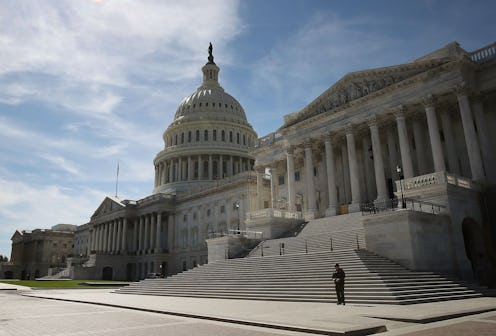In addition to voting for President on Nov. 8, voters in the Washington, D.C. also voted on a frequently contested issue in the District — whether or not D.C. should become a state. Election results show that D.C. residents overwhelmingly voted to pass the D.C. statehood referendum, which passed with around 80 percent support among voters with most of the District's 143 precincts reporting around 9:30 p.m. EST.
The process of even arriving at a referendum for Washington, D.C. statehood was long and arduous, both in this instance and throughout history. Throughout the country's history, D.C. has pushed for statehood via a variety of different campaigns. The most recent D.C.-wide vote on statehood was in 1982, which passed when voters ratified the proposed state constitution. It was eventually submitted to Congress following a variety of different legislation and bureaucratic shifts. In 1993, a vote was held on D.C. statehood in the U.S. House of Representatives, however, it was defeated.
The process through which D.C. can become a state is complicated and can occur in one of three ways: through amendment of the U.S. Constitution, through Congress passing a (Congressionally-initiated) bill to approve statehood, or through petitioning Congress to make D.C. a state. The 1982 statehood efforts implemented the third strategy, as does the current statehood movement.
Despite the failures of previous efforts to achieve statehood, proponents of statehood saw 2017 as the opportune time to try again. The anticipated administration changes, including the possible shift of the Senate (to be determined tonight), meant that there was possibly an increased likelihood D.C. statehood could receive Congressional approval. Additionally, following an overwhelmingly positive vote for District budget autonomy back in April 2013, the statehood movement believed this was indicative of a high preference for overall autonomy it the District, and decided to pursue the objective. Considering the outcome of the vote, it turns out they were right.
In voting for statehood in the election, D.C. voters that voted "Yes" actually agreed to a four-part statement that was on their ballots. A "yes" vote meant you agreed with all four parts of the statement and a "no" indicated you did not (the vote was either all or nothing). The four parts of the statement consisted of: 1) Statehood itself, and the notion that D.C. should become a state; 2) The proposed state constitution that was recently drafted during a constitutional convention ; 3) The proposed new state boundaries that would still include a very small federal district as required by the U.S. Constitution; and 4) the notion that you would support and abide by a representative government in the new state.
Though statehood could bring benefits it would bring to the District, there are also some potential downfalls. The benefits include representation in Congress via two senators and one representative, something that has long been an issue for D.C. residents, so much so that official license plates in the District have the phrase "Taxation without Representation" emblazoned on them. Additional benefits of statehood include the ability to levy taxes, including a commuter tax, as well as freedom from Congressional interference on a variety of D.C.-specific issues. This includes the sale of marijuana, which D.C. could potentially tax and regulate as a state, as the commodity is legal in the District. However, becoming a state also has (quite literal) costs, and D.C. may have to move away from its intensive reliance on federal funds should it become a state, something to which it would have to adjust.
While D.C. voters have clearly made their voices heard today on the issue of D.C. statehood, a long, drawn-out process will determine whether or not the District actually becomes a state. The referendum voted on today does not actually determine statehood, but instead, indicates to Congress that Statehood is desired by the residents of D.C. Congress then has to approve a statehood bill in both houses, which will take a great deal of time, and lots of lobbying on behalf of the statehood movement, which is currently underfunded.
Thus, while voters have expressed their strong desire to achieve D.C. statehood this evening, only time will tell if this will actually occur — and history indicates that it may be an uphill battle.
